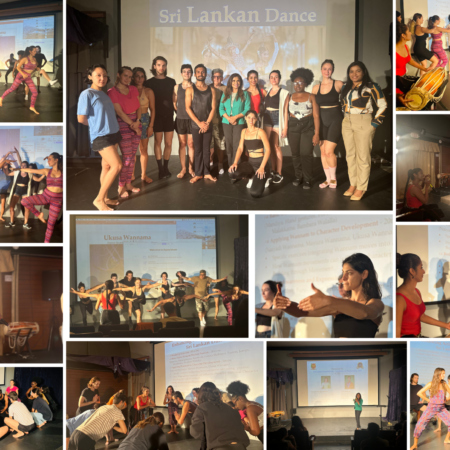Nimisha Muttiah,
Ph.D., CCC-SLP
Speech-Language Pathologist speechtherapysl@gmail.com
Autism Spectrum Disorders (ASD) is described as a neurodevelopmental condition that is characterized by impairments in social-communication and the manifestation of repetitive and/or unusual behaviors. Recently, there has been a sharp increase in the prevalence of ASD. For example, data from the Center for the Disease Control (CDC) in the United States suggests 1 in 68 children are identified as having a diagnosis of ASD. However, global epidemiological data on individuals with ASD — specifically those living in low- and middle-income (LAMI) countries, such as Sri Lanka — is scarce.
One of the most significant challenges faced by individuals with ASD and their families is difficulty with obtaining a diagnosis of ASD. Currently, there are no autism screening tools that are universally used in Sri Lanka by child psychiatrists or pediatricians that would assist with the identification process. There is also a lack of appropriate, culturally sensitive, and standardized diagnostic tools. This is a major barrier to obtaining a diagnosis and accessing much needed services for children suspected of being on the autism spectrum. In addition, many General Medical Officers (GMOs) in Sri Lanka, who are often the first point of contact for families, may not be aware of the characteristics of ASD and may be unsure how to advice parents or may dismiss their concerns regarding their children. Therefore, families that are able. to afford, seek help to obtain a diagnosis elsewhere, spending valuable time and financial resources to travel to other more developed countries.
Sri Lanka is a country that highly values education. A recent study conducted by us, on the special education system identified that children with a wide variety of diagnoses accessed special education services. In addition, approximately 10% of the children included in this study were diagnosed with ASD. Thus, it was encouraging to note some awareness of ASD. One of the parents in the study discussed a positive aspect of the special education system saying, “It is free education. We have no money; everything is provided by the school, everything is free.” This study indicated that a majority of the children accessing special education services were described as having mild or moderate levels of disability. Thereby, children who were on the more severe end of the spectrum were either not accessing educational services or were not included in this particular sample. While parents of children with ASD reported positive aspects of the special education system, they also reported significant barriers: Very few schools accepted children with ASD; even the schools that did accept these. children only accepted a limited number per year; extra-curricular activities (e.g., music, dancing) were lacking in many schools; and in general facilities for the children were inadequate. In addition, training for special educators is limited. One of the key barriers to providing special education services is a dearth of systematic procedures and trained teachers.
Accessing services such as special education, speech therapy, occupational therapy, and physical therapy for children with ASD is essential. Children with ASD often present with significant communication impairments. Globally, speech-language therapists (SLTs) have been recognized as specialist professionals who support individuals with communication difficulties. It is encouraging to note that a Bachelor’s degree program in Speech and Language Therapy is ongoing at the Kelaniya University. Locally, these professionals work primarily in hospitals, with a handful employed in private schools. However, it will take a few years for countries like Sri Lanka to reach a similar ratio of SLTs to the population as is currently present in developed countries.
One of the biggest challenges facing adults with ASD in Sri Lanka is the lack of adult services and employment opportunities. Services for adult children above the age of 18 years are extremely limited in Sri Lanka. There are only a handful of organizations that provide adult day program facilities. Often, these are located in urban centers; more remote, rural areas receive limited to no services. Parents, who’s children attended special education units run by the government reported that when their children exceeded 14 years they were no longer allowed to attend school. Parents expressed serious concerns about their children’s future once they aged out of the school system. In addition, employment opportunities for adults with ASD are scarce to non-existent in Sri Lanka. On the rare occasion when an adult with ASD has been successful in finding employment the outcome has not always been positive. A recent incident was highlighted by the local media of a 23-year old adult with ASD who was sexually abused by four co-workers at his place of work. Such incidents are distressing and all too common.
There is a general lack of awareness among Sri Lankan society regarding people with disabilities, especially those with ASD. There is deep-seated stigma associated with disability in this country. This stigma often makes people unwilling to even admit they have a family member with a disability. Children and adults with ASD may not be taken out in public for fear of embarrassment and shame from society. As one parent from a Sri Lankan study said about her son with autism, “Sometimes when children like this are taken to places it becomes an issue to other people. We face many situations like this as his appearance is like a normal child but people realize from his behavior that he is a special needs child. That is a major issue for us as his facial features are normal.”
Research-based evidence is important to ensure best practices for individuals with ASD and the services they receive. There is much more that needs to happen locally for individuals with ASD. We as a community and as a country need to come together to better these children’s and adults’ lives. We have a moral responsibility to protect the well being of the most vulnerable members of our society.
The author Dr. Nimisha Muttiah is a speech-language pathologist who has recently returned to Sri Lanka after spending the past 10 years studying and working in the USA. Her Ph. D. specialized in working with individuals who have significant communication needs and autism spectrum disorders. If you would like to obtain more information you can connect with her in person at a free seminar on July 23’ at 3pm at the Ladies’ College Institute of Professional Studies, located at 27th Lane, off Inner Flower Road, Colombo 03. Contact: 011-2574194 Website: www.lcips.lk






















